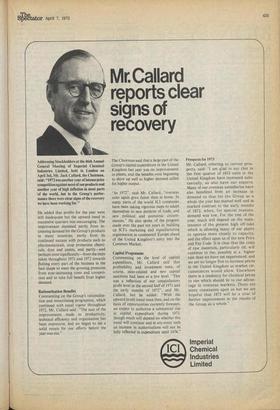Mr. Callard reports clear signs of recovery
Addressing Stockholders at the 46th Annual General Meeting of Imperial Chemical Industries Limited, held in London on April 3rd, Mr. Jack Callard, the Chairman, said: "1972 was another year of intense price competition against most of our products and another year of high inflation in most parts of the world, but in the Group's performance there were clear signs of the recovery we have been working for."
He added that profits for the year were still inadequate but the upward trend in successive quarters was encouraging. The improvement stemmed partly from increasing demand for the Group's products in many countries, partly from its continued success with products such as pharmaceuticals, crop protection chemicals, dyes and paints, and partly—and perhaps most significantly—from the steps taken throughout 1971 and 1972 towards nutting every part of the business in the best shape to meet the growing pressures from ever-increasing costs and competition and to take full benefit from higher demand.
Rationalisation Benefits
Commenting on the Group's rationalisation and streamlining programme, which continued with equal vigour throughout 1972, Mr. Callard said: "The sum of the improvements made in productivity, technical efficiency and organisation has been impressive, and we began to see a solid return for our efforts before the year was out." The Chairman said that a large part of the Group's capital expenditure in the United Kingdom last year was on improvements to plants, and the benefits were beginning to show up well as higher demand called for higher output.
"In 1972", said Mr. Callard, "overseas sales again grew faster than at home. In many parts of the world ICI companies have been taking vigorous steps to adapt themselves to new patterns of trade, and new political and economic circumstances." He also spoke of the progress made over the past ten years in building LIP ICI's marketing and manufacturing organisation in continental Europe ahead of the United Kingdom's entry into the Common Market.
Capital Programme
Commenting on the level of caPital expenditure, Mr. Callard said that profitability and investment were, of course, inter-related and new capital sanctions had been at a low level. "This was a reflection of our unsatisfactory profit level in the second half of 1971 and the early months of 1972", said Mr. Callard, but he added: "With the upward profit trend since then, and on the basis of opportunities currently foreseen, we expect to authorise a substantial rise in capital expenditure during 1973, though much will depend on whether this trend will continue and in any event such an increase in authorisations will not be fully reflected in expenditure until 1974."
Prospects for 1973
Mr. Callard, referring to current prospects, said: "I am glad to say that in the first quarter of 1973 sales in the United Kingdom have increased substantially, as also have our exports. Many of our overseas subsidiaries have also benefited from an increase in demand so that for the Group as a whole the year has started well and in marked contrast to the early months of 1972, when, for special reasons, demand was low. For the rest of the year, much will depend on the maintenance of the present high off-take which is allowing many of our plants to operate more closely to capacity, and the effect upon us of the new Price and Pay Code. It is clear that the costs of raw materials, .particularly oil, will continue to rise, possibly at a higher rate than we have yet experienced, and we are no longer free to increase prices in the United Kingdom as market circumstances would allow. Elsewhere there is a tendency for chemical prices to rise which should be to our advantage in overseas markets. There are many constraints upon us but we are hopeful that 1973 will be a year of further improvement in the results of the Group as a whole."


































 Previous page
Previous page